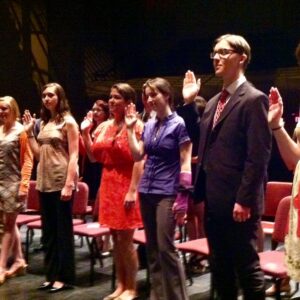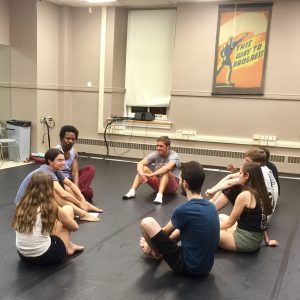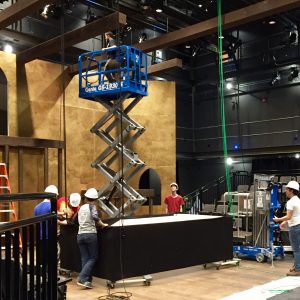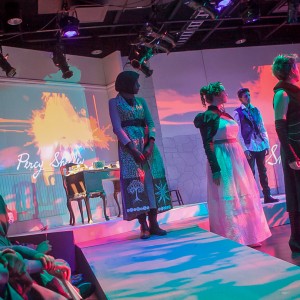Mission Statement
Our Mission Statement tells you about common goals and shared values of the artists and educators in the Theater Department. How we understand theater affects how you learn and grow.
Department of Theater’s Mission Statement
The Department of Theater at Lafayette College is committed to nurturing artists, scholars, and collaborators through a rigorous and integrated course of study in the classroom, in the studio, and in production. In exploring the multidisciplinary nature of theater as well as its historical legacies, global traditions, and contemporary challenges, both our curriculum and our productions train students, regardless of major, to thrive in a wide range of future endeavors. Our focus on mentoring and student-centered learning assists students in developing valuable life skills applicable to any career path, while also preparing serious theater students for both graduate study and professional careers in theater and related fields. The Department also serves the Lafayette campus and surrounding communities by creating productions that instill in College and local audiences of all ages a deep and lifelong appreciation for the theater and embody an aesthetic of performance that is dynamic, inclusive, and responsive to issues facing the planet.
__________________________________________
More About the Department of Theater
- The Department of Theater at Lafayette College is committed to nurturing twenty-first century artists, scholars, and collaborators who grasp the multidisciplinary nature of theater as well as its historical legacies, global traditions, and contemporary challenges. Theater Department faculty share a dedication to teaching and learning initiatives that help students apply theatrical ideas and practice to analyzing visual, textual, and performative modes of expression and to understanding the world.
- The Department offers an A.B. Major in Theater and a Minor in Theater. In addition, all Lafayette students can elect to take Theater Department courses and participate in Department productions. Grounded in the tradition of humanistic inquiry and informed by emerging technologies, the Department fosters artistic growth and intellectual achievement through a program of student-centered learning. Guided and mentored by a Department faculty of accomplished scholars, students learn by doing as assistants to both faculty and visiting theater artists. The Department affirms the contributions theater practitioners make to student progress by sponsoring residencies, workshops, and master classes with guest artists, as well as by engaging theater professionals for Department productions who collaborate with students and faculty throughout the production process.
- Theater students are granted opportunities to explore their visions and to exercise their developing skills through independent projects and self-produced performances, thereby enacting the scholarly and critical knowledge base of the discipline and applying this knowledge to theater practice.
- The Department prepares students for both graduate study and professional careers in theater and related fields; moreover, the Department helps students develop valuable life skills applicable to any career path. The Department also recommends that students avail themselves of off-campus theater opportunities and semester study abroad to stretch the boundaries of their College Hill experience, fostering connections between the education they receive at Lafayette to the professional theater and the larger world.
- The Department presents faculty-directed productions, student projects, and workshops throughout the academic year in the Weiss Theater and the Studio Theater, as well as in experimental spaces and outdoor locations on campus. The production season, which reflects the Department’s commitment to diversity and its exploration of genre and style, helps to shape and enrich life on campus and in the local community. Classes taught by theater faculty are connected to this rigorous production program as well, centering on student involvement, leadership, and growth. The Department values this intersection of the academic and the practical, allowing the focus of each to inform and inspire the other.
- For productions, as in pedagogy, the Department is committed to meeting accepted standards of sustainability and conforming to environmentally sound practices. The Department strongly encourages students, including those students involved in Department productions as an extra-curricular activity, to consider the social and political dimensions of theater, thus reinforcing the Department’s commitment to an aesthetic of performance that is dynamic, inclusive, and responsive to issues facing the planet.




